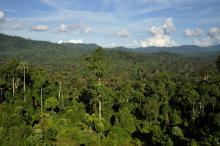University of British Columbia researchers are part of European Space Agency’s Plank satellite mission that is revealing thousands of “exotic” astronomical objects, including extremely cold dust clouds, galaxies with powerful nuclei, and giant clusters of galaxies.
The international collaboration of scientists from 15 countries is presenting more than 25 scientific papers today in Paris, France, on the first results from the Planck mission. Launched in 2009, the Planck satellite is probing the entire sky at microwave wavelengths from 0.35 millimetre to one centimetre. By measuring the cosmic microwave background – the oldest source of light in the Universe –at these wavelengths, Planck has provided an unprecedented view of the sky.
Amongst the results released today is the Early Release Compact Source Catalogue, a guidebook of 10,000 extraterrestrial objects that, while appearing unremarkable through optical telescopes from Earth, may provide vital information about the structure and evolution of the Universe.
“In addition to studying the microwave background, Planck maps the ‘foreground’ emission from our own galaxy and all the stuff between here and the background,” says UBC astronomy professor Douglas Scott, who led the UBC team that helped develop software to analyze and calibrate the vast amounts of data before they were used to create maps of the sky.
“This new information will help scientists learn about the coldest clumps of gas and dust where stars are forming, the properties of unusual forms of cosmic dust, huge clusters of never-before-seen galaxies, and how dust-filled galaxies evolve over the history of the Universe,” says Scott.
Planck is a European Space Agency mission, with contributions from other agencies including the Canadian Space Agency (CSA). The CSA supports two Canadian research groups based at UBC and at the University of Toronto.
The UBC team consists of Prof. Scott and research associates Adam Moss, Jim Zibin and Andrew Walker in the Dept. of Physics and Astronomy.
The Canadian Space Agency’s news release is available at:
http://www.asc-csa.gc.ca/eng/media/news_releases/2011/0111.asp
Musqueam First Nation land acknowledegement
We honour xwməθkwəy̓ əm (Musqueam) on whose ancestral, unceded territory UBC Vancouver is situated. UBC Science is committed to building meaningful relationships with Indigenous peoples so we can advance Reconciliation and ensure traditional ways of knowing enrich our teaching and research.
Learn more: Musqueam First Nation
Faculty of Science
Office of the Dean, Earth Sciences Building2178–2207 Main Mall
Vancouver, BC Canada
V6T 1Z4


